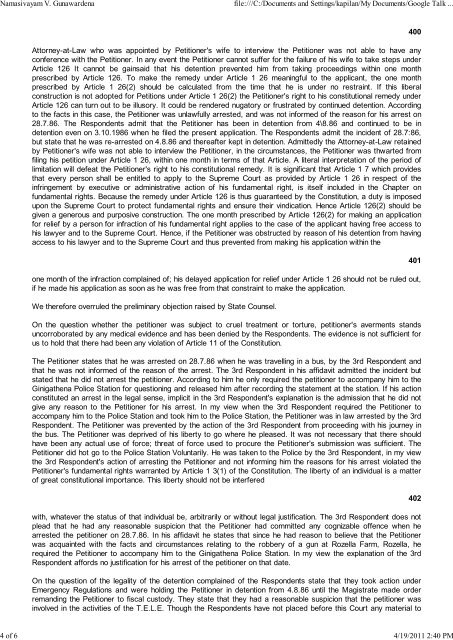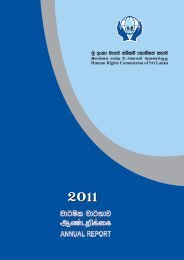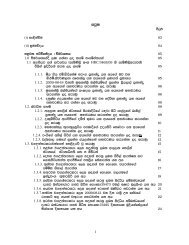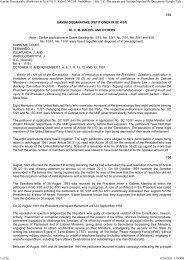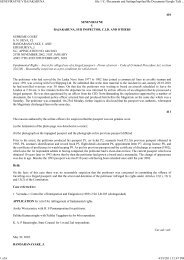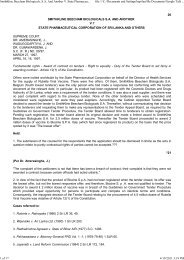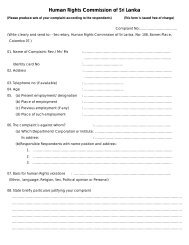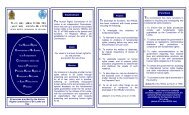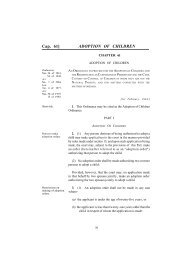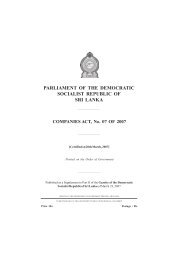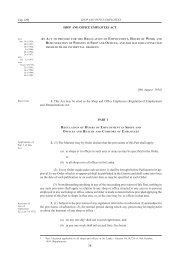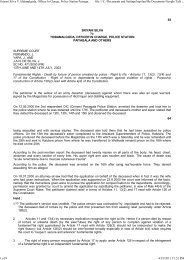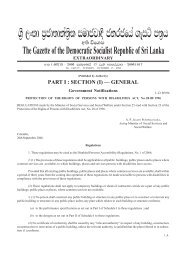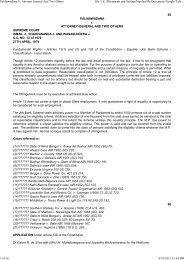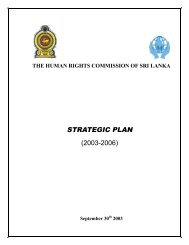Namasivayam V. Gunawardena
Namasivayam V. Gunawardena
Namasivayam V. Gunawardena
You also want an ePaper? Increase the reach of your titles
YUMPU automatically turns print PDFs into web optimized ePapers that Google loves.
<strong>Namasivayam</strong> V. <strong>Gunawardena</strong> file:///C:/Documents and Settings/kapilan/My Documents/Google Talk ...<br />
Attorney-at-Law who was appointed by Petitioner's wife to interview the Petitioner was not able to have any<br />
conference with the Petitioner. In any event the Petitioner cannot suffer for the failure of his wife to take steps under<br />
Article 126 It cannot be gainsaid that his detention prevented him from taking proceedings within one month<br />
prescribed by Article 126. To make the remedy under Article 1 26 meaningful to the applicant, the one month<br />
prescribed by Article 1 26(2) should be calculated from the time that he is under no restraint. If this liberal<br />
construction is not adopted for Petitions under Article 1 26(2) the Petitioner's right to his constitutional remedy under<br />
Article 126 can turn out to be illusory. It could be rendered nugatory or frustrated by continued detention. According<br />
to the facts in this case, the Petitioner was unlawfully arrested, and was not informed of the reason for his arrest on<br />
28.7.86. The Respondents admit that the Petitioner has been in detention from 4\8.86 and continued to be in<br />
detention even on 3.10.1986 when he filed the present application. The Respondents admit the incident of 28.7:86,<br />
but state that he was re-arrested on 4.8.86 and thereafter kept in detention. Admittedly the Attorney-at-Law retained<br />
by Petitioner's wife was not able to interview the Petitioner, in the circumstances, the Petitioner was thwarted from<br />
filing his petition under Article 1 26, within one month in terms of that Article. A literal interpretation of the period of<br />
limitation will defeat the Petitioner's right to his constitutional remedy. It is significant that Article 1 7 which provides<br />
that every person shall be entitled to apply to the Supreme Court as provided by Article 1 26 in respect of the<br />
infringement by executive or administrative action of his fundamental right, is itself included in the Chapter on<br />
fundamental rights. Because the remedy under Article 126 is thus guaranteed by the Constitution, a duty is imposed<br />
upon the Supreme Court to protect fundamental rights and ensure their vindication. Hence Article 126(2) should be<br />
given a generous and purposive construction. The one month prescribed by Article 126(2) for making an application<br />
for relief by a person for infraction of his fundamental right applies to the case of the applicant having free access to<br />
his lawyer and to the Supreme Court. Hence, if the Petitioner was obstructed by reason of his detention from having<br />
access to his lawyer and to the Supreme Court and thus prevented from making his application within the<br />
one month of the infraction complained of; his delayed application for relief under Article 1 26 should not be ruled out,<br />
if he made his application as soon as he was free from that constraint to make the application.<br />
We therefore overruled the preliminary objection raised by State Counsel.<br />
On the question whether the petitioner was subject to cruel treatment or torture, petitioner's averments stands<br />
uncorroborated by any medical evidence and has been denied by the Respondents. The evidence is not sufficient for<br />
us to hold that there had been any violation of Article 11 of the Constitution.<br />
The Petitioner states that he was arrested on 28.7.86 when he was travelling in a bus, by the 3rd Respondent and<br />
that he was not informed of the reason of the arrest. The 3rd Respondent in his affidavit admitted the incident but<br />
stated that he did not arrest the petitioner. According to him he only required the petitioner to accompany him to the<br />
Ginigathena Police Station for questioning and released him after recording the statement at the station. If his action<br />
constituted an arrest in the legal sense, implicit in the 3rd Respondent's explanation is the admission that he did not<br />
give any reason to the Petitioner for his arrest. In my view when the 3rd Respondent required the Petitioner to<br />
accompany him to the Police Station and took him to the Police Station, the Petitioner was in law arrested by the 3rd<br />
Respondent. The Petitioner was prevented by the action of the 3rd Respondent from proceeding with his journey in<br />
the bus. The Petitioner was deprived of his liberty to go where he pleased. It was not necessary that there should<br />
have been any actual use of force; threat of force used to procure the Petitioner's submission was sufficient. The<br />
Petitioner did hot go to the Police Station Voluntarily. He was taken to the Police by the 3rd Respondent, in my view<br />
the 3rd Respondent's action of arresting the Petitioner and not informing him the reasons for his arrest violated the<br />
Petitioner's fundamental rights warranted by Article 1 3(1) of the Constitution. The liberty of an individual is a matter<br />
of great constitutional importance. This liberty should not be interfered<br />
with, whatever the status of that individual be, arbitrarily or without legal justification. The 3rd Respondent does not<br />
plead that he had any reasonable suspicion that the Petitioner had committed any cognizable offence when he<br />
arrested the petitioner on 28.7.86. In his affidavit he states that since he had reason to believe that the Petitioner<br />
was acquainted with the facts and circumstances relating to the robbery of a gun at Rozella Farm, Rozella, he<br />
required the Petitioner to accompany him to the Ginigathena Police Station. In my view the explanation of the 3rd<br />
Respondent affords no justification for his arrest of the petitioner on that date.<br />
On the question of the legality of the detention complained of the Respondents state that they took action under<br />
Emergency Regulations and were holding the Petitioner in detention from 4.8.86 until the Magistrate made order<br />
remanding the Petitioner to fiscal custody. They state that they had a reasonable suspicion that the petitioner was<br />
involved in the activities of the T.E.L.E. Though the Respondents have not placed before this Court any material to<br />
4 of 6 4/19/2011 2:40 PM<br />
400<br />
401<br />
402


